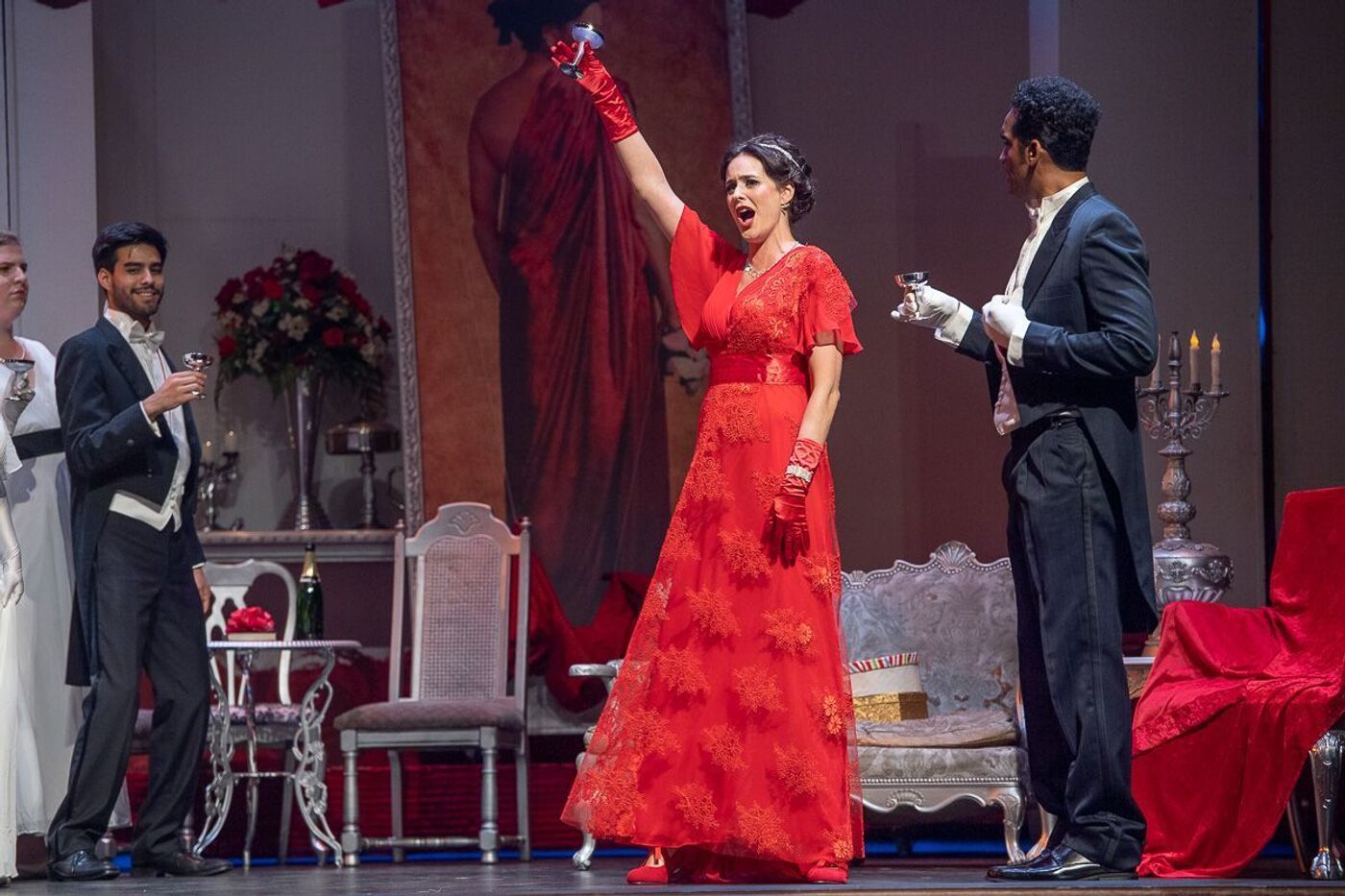Review: LA TRAVIATA at Thorne Hall Occidental College

On Sunday October 28, 2018, Pacific Opera Project (POP) presented Giuseppe Verdi's well-loved opera, LA TRAVIATA to a full house at Occidental College's Thorne Hall in Pasadena. Director and Designer Josh Shaw presented a traditional production with a unit set that spoke of flowers and the beauty of the earth despite the terrors of disease in the 19th century.
Violetta's camellias were outlined on the walls of the sets, and appeared among the Act I party decorations. Maggie Green's timeless costumes featured dark suits, many with red vests and gloves, for the men. Violetta and her party-girl friends sparkled in gowns of red, white or a combination of those colors. Although POP has limited funds, it's talent and endless ideas keep the public fascinated.
Shaw's direction enabled his principles to create real characters that suffered from the physical and the social ills of the time and culture in which they lived. Violetta, actually Alphonsine Rose Plessis, was not merely the heroine of an opera. She was a young French girl who by the time she was ten years old was begging on the street for food. Her father forced her into prostitution as soon as she was old enough to be sold. In that milieu, there was no way she could ever become a respectable member of society. Thus, Alfredo's father knows his whole family would be affected by a marriage to her.
Shaw's direction emphasized the position of each character with respect to a harsh society. Already in the first act Violetta knows that she shouldn't expect anything other than the momentary pleasure of his company from Alfredo. Only he thinks otherwise. Everyone else knows their relationship is doomed. What librettist Piave and composer Verdi wrote is what Shaw underlined in his chilling picture of nineteenth century mores.
When Violetta sang "Follie. follie" at the end of her first act party, she set the scene for the tragedy. Alfredo only began to understand when he saw that Violetta was selling her possessions. He sang the cabaletta "O mio rimorso, o infamia" at the end of his second act aria "De' miei bollenti spiriti." That short piece is often omitted, but with a capable singer, Shaw kept it in and used it to underscore the difference between two social classes.
One of the reasons patrons keep returning to POP is for the fresh young voices usually heard there. As Violetta, Amanda Kingston's stage presence commanded attention right from her opening notes. Although her sound was a bit harsh at the opening she soon came into her own as a soprano with shimmering tones and accurate coloratura for the first act. Singing with assurance and smooth lines, she projected strength of character during her confrontation with Alfredo's father. When singing about Germont's other child, his daughter, Kingston emitted delicate pianissimo tones but upon agreeing to leave Alfredo her dramatic cries of anguish were heart rending. Most affecting was her reading of the letter and her rendition of "Addio del passato" that followed it in Act four.
Orson Van Gay was an ardent Alfredo who projected love for Violetta and the desire to change her life. When he thought she had left him for a rich suitor, however, his anger also knew no bounds. Singing with a slightly smaller voice than Kingston's, his sound was fluent and his high notes golden.
When Eric McKeever joined his colleagues in Act II, patrons moved to the front of their seats. His strong, steel-girded voice was most impressive but never acidic. His patronizing behavior toward Violetta moderated as soon as he realized that she was a woman of more substance than he expected. Later, in the final act, his attitude changed completely when he comprehanded that she would never live to change anything. I'm sure we will hear a great deal more from McKeever.
Mezzo-soprano Laura Zahn sang with powerful tones as a dramatic Flora whose line was always confident. Soprano Emily Rosenberg was an efficient Annina with a sweet sounding voice. As Baron Duphol, Luvi Avendano sang with a resonant sound. Phil Meyer was a commanding Dr. Grenvil while Joel Balzun, Joshua Alarcon, Scott Ziemann, and Brandon Mautz all created viable characters.
One of the reasons for performing at the college was the availability of its chorus to augment POP's own vocal ensemble. Together they filled the stage with glorious harmonies. I missed seeing Conductor Jesse Leong and his 21-piece orchestra because they were hidden behind the sets for the entire performance. No matter, they played impeccably except for a note or two in the last act. POP's LA TRAVIATA provided Angelinos with a fascinating afternoon, the end of which brought out many a handkerchief. The company's next performance is a "Hipsters" LA BOHEME beginning December 5 at the Ebell Club in Highland Park.
Photos by Martha Benedict for Pacific Opera Project
Reader Reviews

Videos


